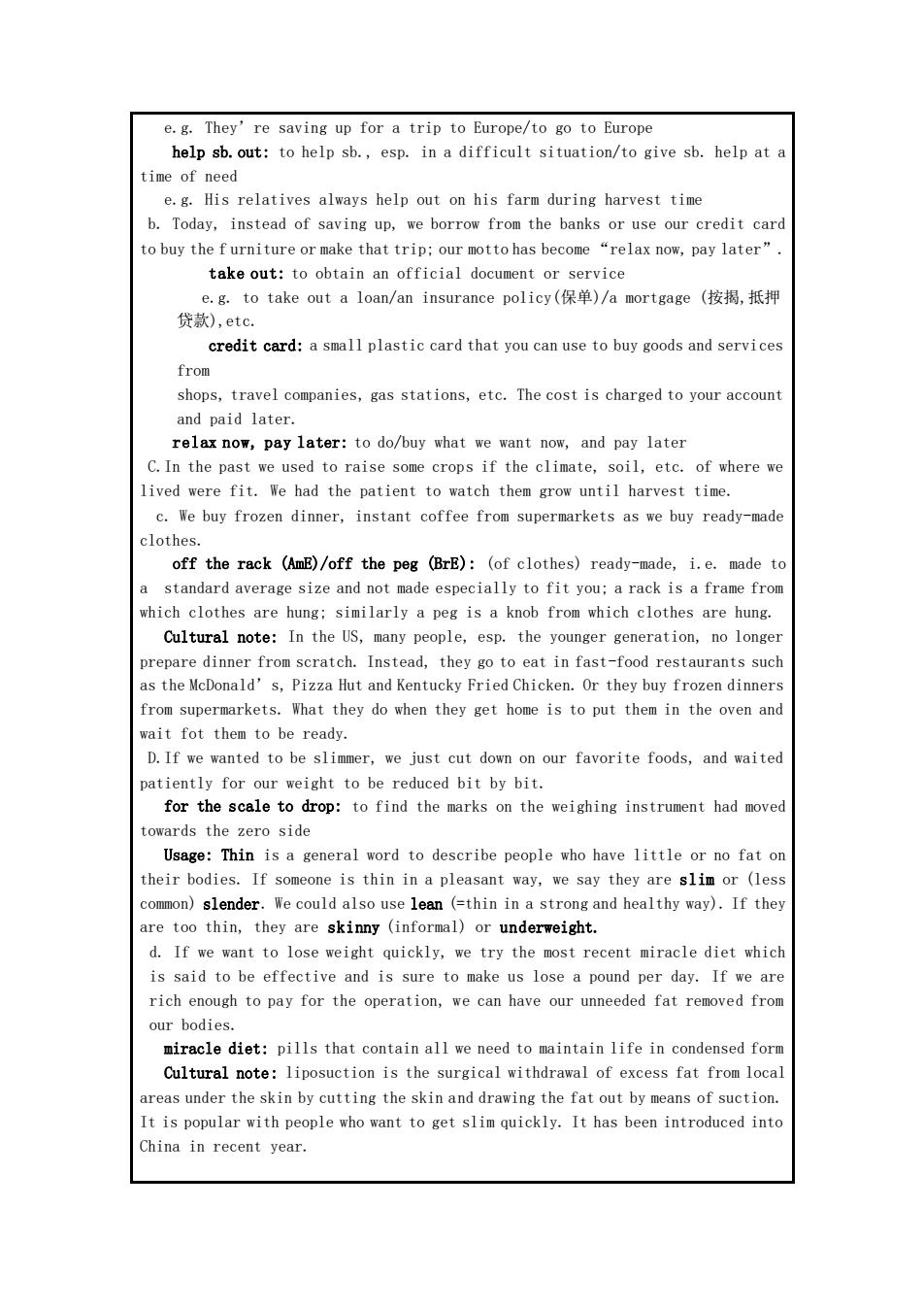
o de om .out:to help sb.,esp.in a difficult situation/to give sb.help at time of need e.g.His relatives always help out on his farm during harvest time b.Today,instead of saving up,we borrow from the banks or use our credit card to buy the f urniture or make that trip:our motto has become "relax now,pay later" take out:to obtain an official document or ervic e.g.to take out a loan/an insurance policy(保单)/a mortgage(按揭,抵押 贷款),etc. credit card:a small plastic card that you can use to buy goods and services from shops travel companies,gas stations,etc.The cost is charged to your accour and paid later. relax now,pay later:to do/buy what we want now,and pay later C.In the past we used to raise some crops if the climate,soil,etc.of where we lived were fit.We had the patient to watch them grow until harvest time. c.We buy frozen dinner,instant coffee from supermarkets as we buy ready-mad clothes off the rack (AmE)/off the peg (BrB):(of clothes)ready-made,i.e.made to a standard average size and not made especially to fit you:a rack is a frame from which clothes are hung;similarly a peg is a knob from which clothes are hung. Cultural note:In the US,many people,esp.the younger generation,no longe prepare dinner ch.Inst ad, ey go to eat in fast restaurant as the McDonald's,Pizza Hut and Kentucky Fried Chicken.Or they buy frozen dinners from supermarkets.What they do when they get home is to put them in the oven and wait fot them to be ready. D.If we wanted to be slimmer,we iust cut down on our favorite foods.and waited weight to be reduced bit by bit poAou pey iuounni suy sutyarow oui uo sxiom ou3 Puyj o1 :doxp o3 oToos on tog towards the zero side Usage:Thin is a general word to describe people who have little or no fat or their bodies.If someone is thin in a pleasant way,we say they are slim or (less common)slender.We could also use lean (=thin in a strong and healthy way).If they are too thin,they are skinny (informal)or underweight d.If we want to lose weight quickly,we try the most recent miracle diet which is said to be effective and is sure to make us lose a pound per day.If we are rich enough to pay for the operation,we can have our unneeded fat removed from our bodies. miracle diet:pills that contain all we need to maintain life in condensed forn Cultural note:liposuction is the surgical withdrawal of excess fat from loca areas under the skin by cutting the skin and drawing the fat out by means of suction. It is popular with people who want to get slim quickly.It has been introduced into China in recent year
e.g. They’re saving up for a trip to Europe/to go to Europe help sb.out: to help sb., esp. in a difficult situation/to give sb. help at a time of need e.g. His relatives always help out on his farm during harvest time b. Today, instead of saving up, we borrow from the banks or use our credit card to buy the f urniture or make that trip; our motto has become “relax now, pay later”. take out: to obtain an official document or service e.g. to take out a loan/an insurance policy(保单)/a mortgage (按揭,抵押 贷款),etc. credit card: a small plastic card that you can use to buy goods and services from shops, travel companies, gas stations, etc. The cost is charged to your account and paid later. relax now, pay later: to do/buy what we want now, and pay later C.In the past we used to raise some crops if the climate, soil, etc. of where we lived were fit. We had the patient to watch them grow until harvest time. c. We buy frozen dinner, instant coffee from supermarkets as we buy ready-made clothes. off the rack (AmE)/off the peg (BrE): (of clothes) ready-made, i.e. made to a standard average size and not made especially to fit you; a rack is a frame from which clothes are hung; similarly a peg is a knob from which clothes are hung. Cultural note: In the US, many people, esp. the younger generation, no longer prepare dinner from scratch. Instead, they go to eat in fast-food restaurants such as the McDonald’s, Pizza Hut and Kentucky Fried Chicken. Or they buy frozen dinners from supermarkets. What they do when they get home is to put them in the oven and wait fot them to be ready. D.If we wanted to be slimmer, we just cut down on our favorite foods, and waited patiently for our weight to be reduced bit by bit. for the scale to drop: to find the marks on the weighing instrument had moved towards the zero side Usage: Thin is a general word to describe people who have little or no fat on their bodies. If someone is thin in a pleasant way, we say they are slim or (less common) slender. We could also use lean (=thin in a strong and healthy way). If they are too thin, they are skinny (informal) or underweight. d. If we want to lose weight quickly, we try the most recent miracle diet which is said to be effective and is sure to make us lose a pound per day. If we are rich enough to pay for the operation, we can have our unneeded fat removed from our bodies. miracle diet: pills that contain all we need to maintain life in condensed form Cultural note: liposuction is the surgical withdrawal of excess fat from local areas under the skin by cutting the skin and drawing the fat out by means of suction. It is popular with people who want to get slim quickly. It has been introduced into China in recent year
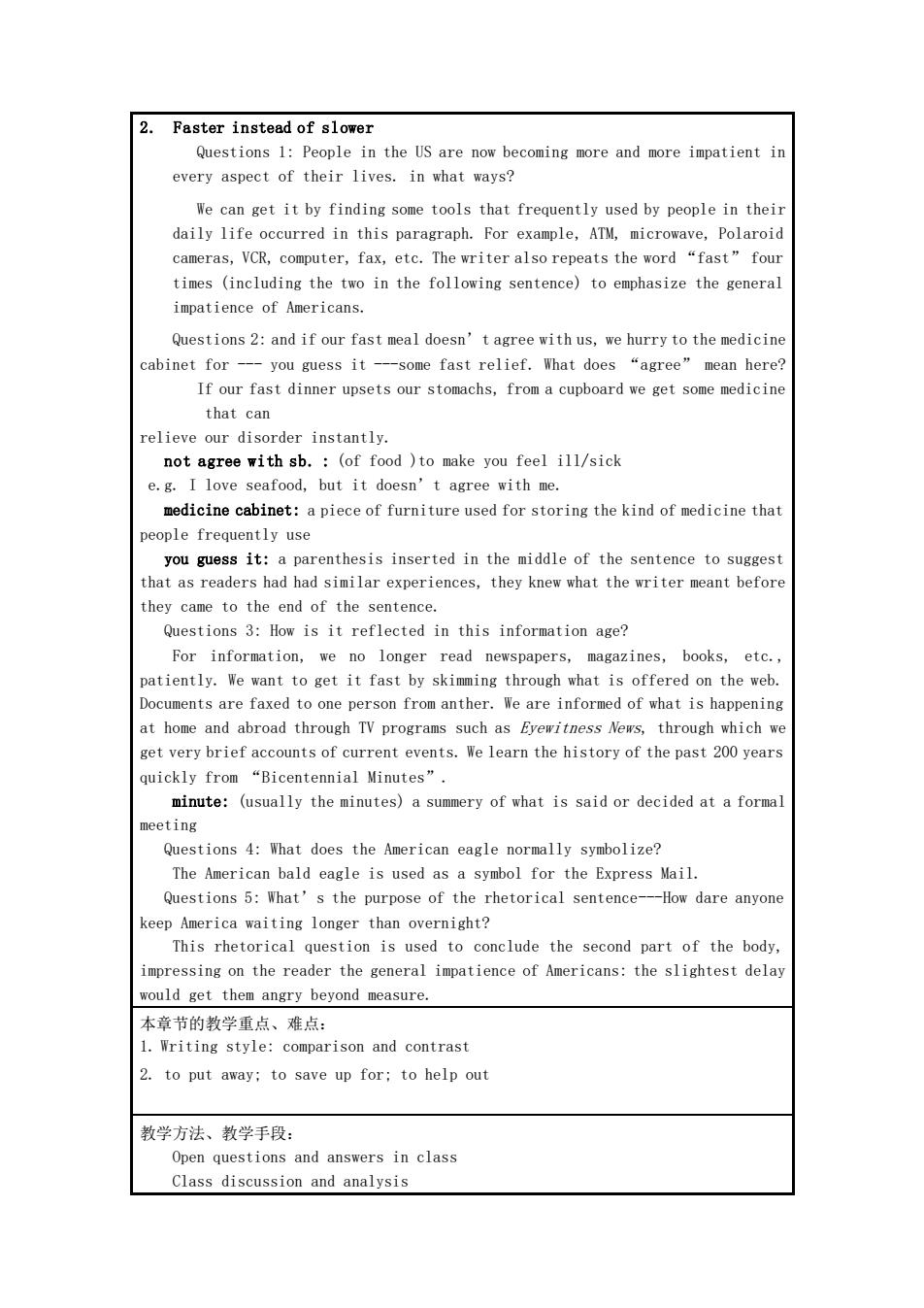
2.Faster instead of slower Questions 1:People in the US are now becoming more and more impatient in every aspect of their lives.in what ways? We can get it by finding some tools that frequently used by people in their daily life occurred in this paragraph.For example,ATM,microwave,Polaroid cameras.VCR.computer.fax.etc.The writer also repeats the word "fast"four times (including the two in the following sentence)to emphasize the genera impatience of Americans. Questions 2:and if our fast meal doesn't agree with us,we hurry to the medicine cabinet for- you guess it-some fast relief.What does "agree"mean here? If our fast dinner upsets our stomachs,from a cupboard we get some medicine that can relieve our disorder instantly. notagre(of food )to mke you feel ill/sick e.g.I love seafood,but it doesn't agree with me medicine cabinet:a piece of furniture used for storing the kind of medicine that people frequently use :a parenthesis inserted in the middle of the ha hadhad similar experiences,they knew what the writer meant befo they came to the end of the sentence. Questions 3:How is it reflected in this information age? For information,we no longer read newspapers,magazines,books,etc. atiently.We want to get it fast by skimming through what is offered on the web Documents are faxed to e pe rson fro anther.eare e informed of what is happ at home and abroad through TV programs such as Eyewitness News through which w get very brief accounts of current events.We learn the history of the past 200 years quickly from“Bicentennial Minutes”. minute:(usually the minutes)a summery of what is said or decided at a forma eeting Questions4:what does the American agle normlly sybolize? The American bald eagle is used as a symbol for the Express Mail. Questions 5:What's the purpose of the rhetorical sentence-How dare anyone keen America gaiting longer than overnight? This rhetorical question is used to conclude the second part of the body impressing on the e reader the general impatience of Americans:the slightest delay would get them angry beyond measure. 本章节的教学重点、难点: 1.Writing style:comparison and contrast 2.to put away;to save up for:to help out 教学方法、教学手段: Class and analysis
2. Faster instead of slower Questions 1: People in the US are now becoming more and more impatient in every aspect of their lives. in what ways? We can get it by finding some tools that frequently used by people in their daily life occurred in this paragraph. For example, ATM, microwave, Polaroid cameras, VCR, computer, fax, etc. The writer also repeats the word “fast” four times (including the two in the following sentence) to emphasize the general impatience of Americans. Questions 2: and if our fast meal doesn’t agree with us, we hurry to the medicine cabinet for - you guess it -some fast relief. What does “agree” mean here? If our fast dinner upsets our stomachs, from a cupboard we get some medicine that can relieve our disorder instantly. not agree with sb. : (of food )to make you feel ill/sick e.g. I love seafood, but it doesn’t agree with me. medicine cabinet: a piece of furniture used for storing the kind of medicine that people frequently use you guess it: a parenthesis inserted in the middle of the sentence to suggest that as readers had had similar experiences, they knew what the writer meant before they came to the end of the sentence. Questions 3: How is it reflected in this information age? For information, we no longer read newspapers, magazines, books, etc., patiently. We want to get it fast by skimming through what is offered on the web. Documents are faxed to one person from anther. We are informed of what is happening at home and abroad through TV programs such as Eyewitness News, through which we get very brief accounts of current events. We learn the history of the past 200 years quickly from “Bicentennial Minutes”. minute: (usually the minutes) a summery of what is said or decided at a formal meeting Questions 4: What does the American eagle normally symbolize? The American bald eagle is used as a symbol for the Express Mail. Questions 5: What’s the purpose of the rhetorical sentence-How dare anyone keep America waiting longer than overnight? This rhetorical question is used to conclude the second part of the body, impressing on the reader the general impatience of Americans: the slightest delay would get them angry beyond measure. 本章节的教学重点、难点: 1. Writing style: comparison and contrast 2. to put away; to save up for; to help out 教学方法、教学手段: Open questions and answers in class Class discussion and analysis
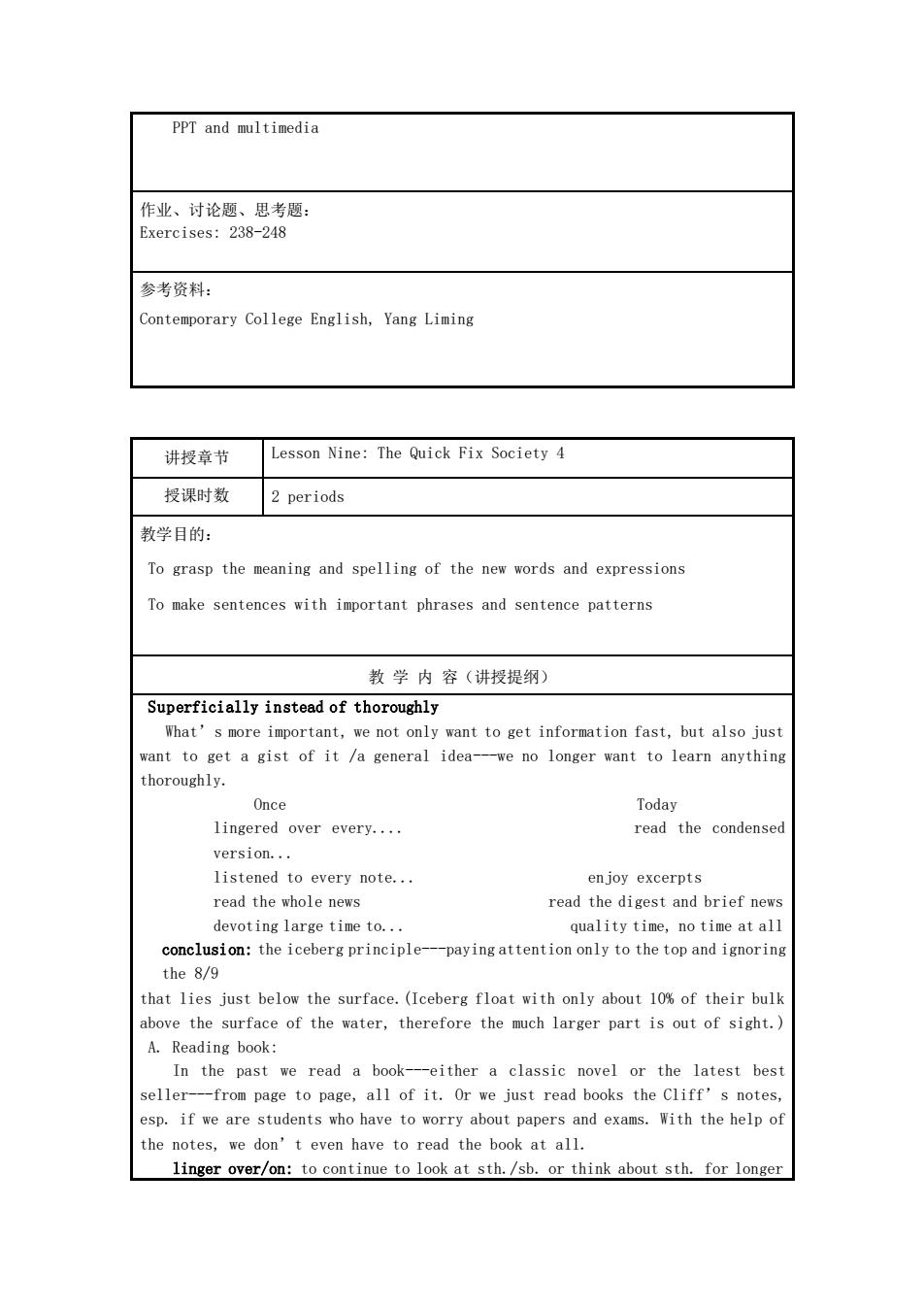
PPT and multimedia 作业、讨论题、思考题: Exercises:238-248 参考资料: Contemporary College English,Yang Liming 讲授章节 Lesson Nine:The Quick Fix Society 4 授课时数 2 periods 教学目的: To grasp the meaning and spelling of the new words and expressions To make sentences with important phrases and sentence patterns 教学内容(讲授提纲) Superficially instead of thoroughly What's more important,we not only want to get information fast,but also just want to get a gist of it /a general idea-we no longer want to learn anything thoroughly. Once Todav lingered over every. read the condensed version. listened to every note. enioy excerpts read the whole news read the digest and brief news devot ing large time to. conclusion:the iceberg principle- the 8/9 that lies just below the surface.(Iceberg float with only about 10%of their bulk above the surface of the water,therefore the much larger part is out of sight.) A.Reading book: In the past we read a book-either a classic novel or the latest best seller- -frompage to page,ofit.e just read books the Cliff's notes esp.if we are students who have to worry about papers and exams.With the help of the notes,we don't even have to read the book at all. linger over/on:to continue to look at sth./sb.or think about sth.for longer
PPT and multimedia 作业、讨论题、思考题: Exercises: 238-248 参考资料: Contemporary College English, Yang Liming 讲授章节 Lesson Nine: The Quick Fix Society 4 授课时数 2 periods 教学目的: To grasp the meaning and spelling of the new words and expressions To make sentences with important phrases and sentence patterns 教 学 内 容(讲授提纲) Superficially instead of thoroughly What’s more important, we not only want to get information fast, but also just want to get a gist of it /a general idea-we no longer want to learn anything thoroughly. Once Today lingered over every. read the condensed version. listened to every note. enjoy excerpts read the whole news read the digest and brief news devoting large time to. quality time, no time at all conclusion: the iceberg principle-paying attention only to the top and ignoring the 8/9 that lies just below the surface.(Iceberg float with only about 10% of their bulk above the surface of the water, therefore the much larger part is out of sight.) A. Reading book: In the past we read a book-either a classic novel or the latest best seller-from page to page, all of it. Or we just read books the Cliff’s notes, esp. if we are students who have to worry about papers and exams. With the help of the notes, we don’t even have to read the book at all. linger over/on: to continue to look at sth./sb. or think about sth. for longer
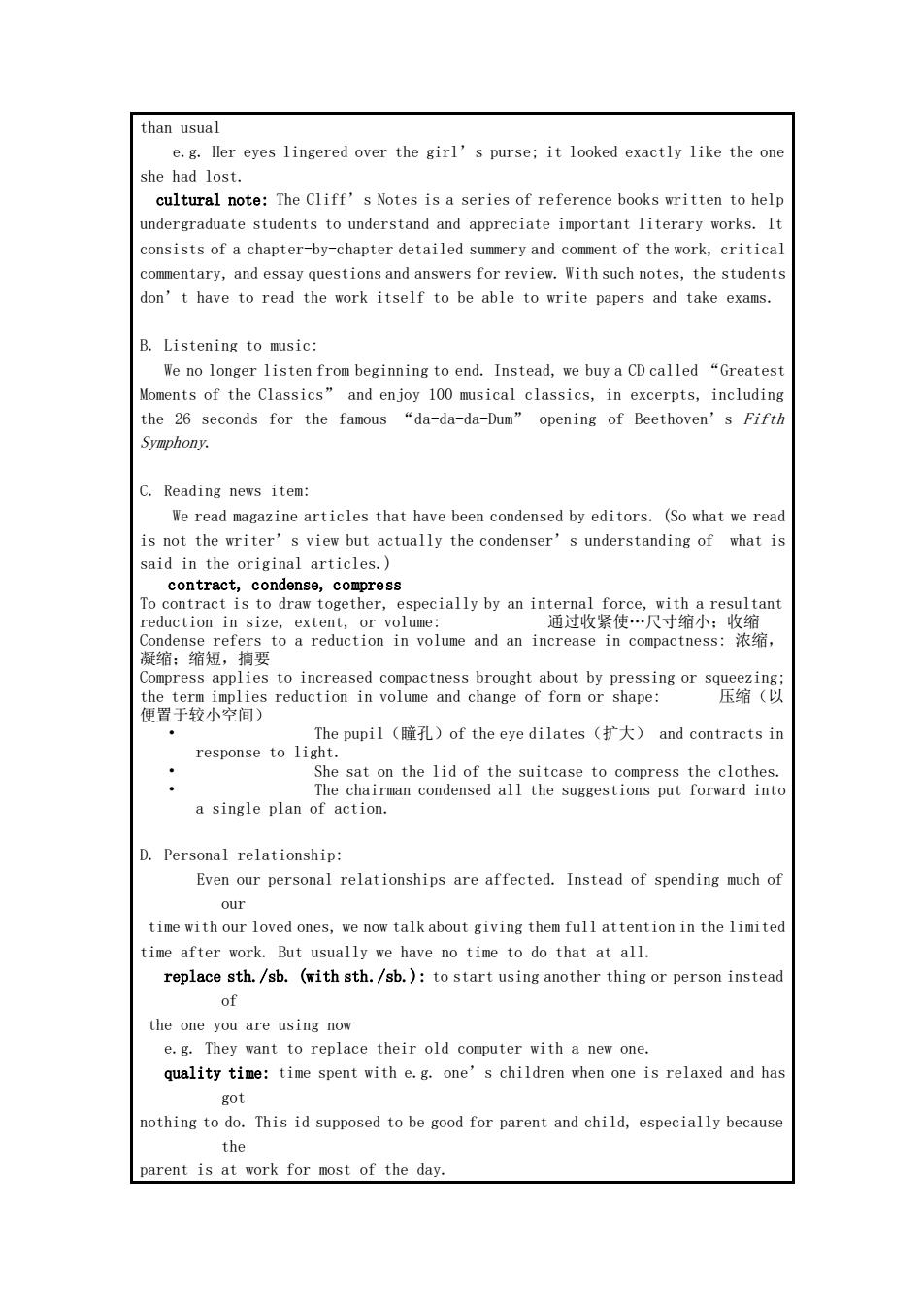
than usual e.g.Her eyes lingered over the girl's purse;it looked exactly like the one she had lost. cultural note:The Cliff's Notes is a series of reference books written to help undergraduate students to understand and appreciate important literary works.It consists of a chapter-by-chapter detailed summery and comment of the ork,critical entary,and essay questions and answers for review.With such notes,the student don't have to read the work itself to be able to write papers and take exams. B.Listening to music: We no longer listen from beginning to end.Instead,we buy a CD called "Greatest ents of the Classics" and enjoy 100 musical classics,in excerpts,including the 26 seconds for the famous "da-da-da-Dum"opening of Beethoven's Fifth Symphony. C.Reading news item: We read magazine articles that have been condensed by editors.(So what we rea is not the writer' s view but actually the condenser's understanding of what is said in the original articles.) contract, con nse,compress pecially by an internal fo sultan reduction in size,extent,or volume: 通过收紧使尺寸缩小:收缩 凝缩"指站f指要oa reduction in volue and an inrease:浓第, Compress applies to increased compactness brought about by pressing or squeezing 压缩(以 The pupil(瞳孔)of the eye dilates(扩大)and contracts in response to light. the clot a single plan of action. D.Personal relationship: Even our personal relationships are affected.Instead of spending much of timewith our loved ones,wenow talkabout giving them full attention in the limite time after work.But usually we have no time to do that at all. replace sth./sb.(with sth./sb.):to start using another thing or person instead of the one you are using now e.g. They ant to replace their old computer with a new one quality time:time spent with e.g.one's children when one is relaxed and has got nothing to do.This id supposed to be good for parent and child,especially because the parent is at work for most of the day
than usual e.g. Her eyes lingered over the girl’s purse; it looked exactly like the one she had lost. cultural note: The Cliff’s Notes is a series of reference books written to help undergraduate students to understand and appreciate important literary works. It consists of a chapter-by-chapter detailed summery and comment of the work, critical commentary, and essay questions and answers for review. With such notes, the students don’t have to read the work itself to be able to write papers and take exams. B. Listening to music: We no longer listen from beginning to end. Instead, we buy a CD called “Greatest Moments of the Classics” and enjoy 100 musical classics, in excerpts, including the 26 seconds for the famous “da-da-da-Dum” opening of Beethoven’s Fifth Symphony. C. Reading news item: We read magazine articles that have been condensed by editors. (So what we read is not the writer’s view but actually the condenser’s understanding of what is said in the original articles.) contract, condense, compress To contract is to draw together, especially by an internal force, with a resultant reduction in size, extent, or volume: 通过收紧使.尺寸缩小;收缩 Condense refers to a reduction in volume and an increase in compactness: 浓缩, 凝缩;缩短,摘要 Compress applies to increased compactness brought about by pressing or squeezing; the term implies reduction in volume and change of form or shape: 压缩(以 便置于较小空间) • The pupil(瞳孔)of the eye dilates(扩大) and contracts in response to light. • She sat on the lid of the suitcase to compress the clothes. • The chairman condensed all the suggestions put forward into a single plan of action. D. Personal relationship: Even our personal relationships are affected. Instead of spending much of our time with our loved ones, we now talk about giving them full attention in the limited time after work. But usually we have no time to do that at all. replace sth./sb. (with sth./sb.): to start using another thing or person instead of the one you are using now e.g. They want to replace their old computer with a new one. quality time: time spent with e.g. one’s children when one is relaxed and has got nothing to do. This id supposed to be good for parent and child, especially because the parent is at work for most of the day
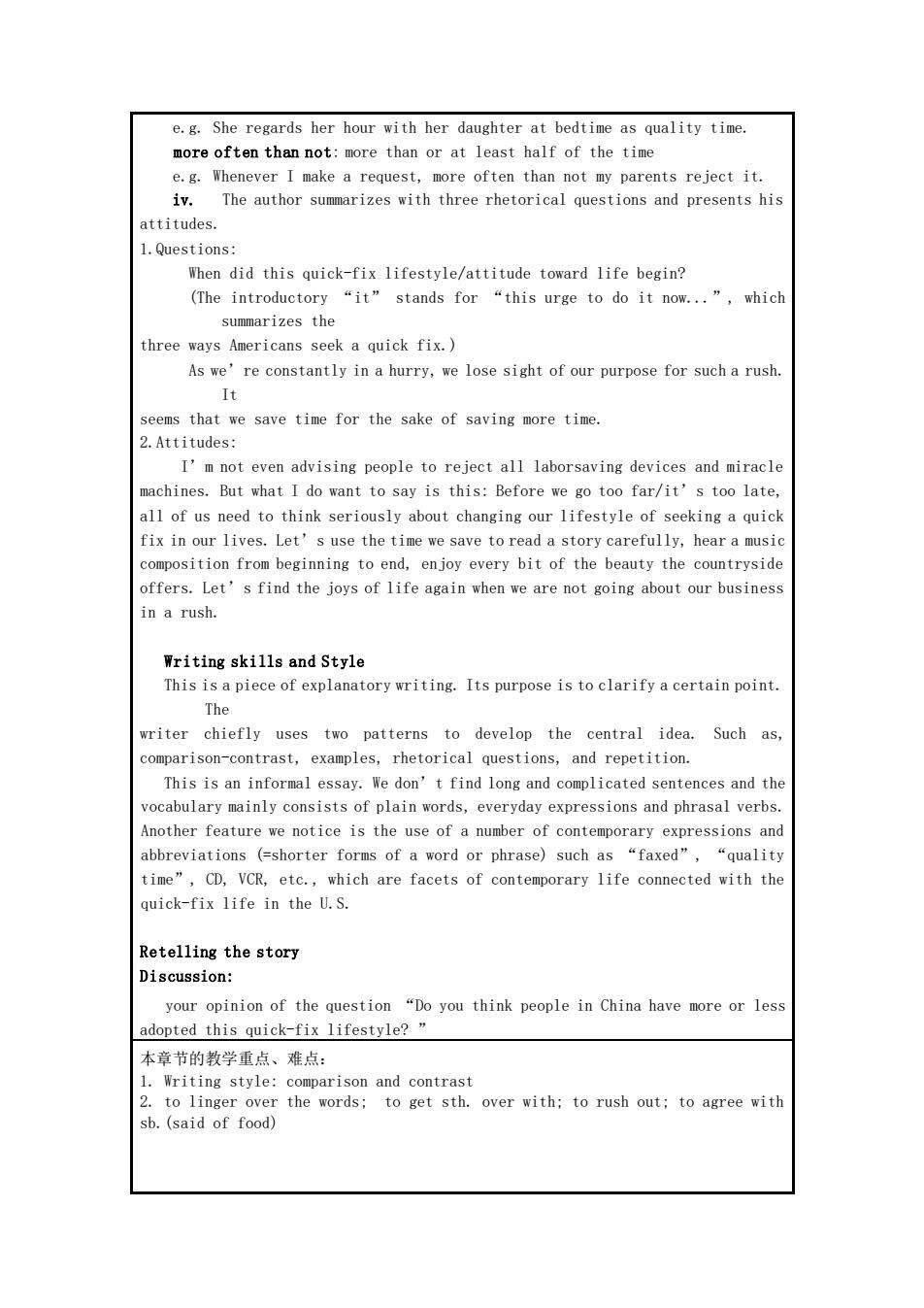
e.g.She regards her hour with her daughterat bedtine as qulity time. more often than not:more than or at least half of the tim e.g.Whenever I make a request,more often than not my parents reject it. iv.The author summarizes with three rhetorical questions and presents his attitudes. L.Questions: When did this quick-fix lifestyle/attitude toward life begin? (The introductory“it”stands for“this urge to do it now.”,hic summarizes the three ways Americans seek a quick fix.) As we're constantly in a hurry,we lose sight of our purpose for such a rush seems that we save time for the sake of saving more time. 2.Attitudes: I'm not even advising people to reiect all laborsaving devices and miracle machines.But what I do want to say is this:Before we go too far/it's too late, all of us need to think seriously about changing our lifestyle of seeking a quick fix in our lives.Let'suse the time we save toread a story carefully,hear a musi composition from beginning to end,enjoy every bit of the beauty the countryside offers.Let's find the joys of life again when we are not going about our business in a rush. Writing skills and Style This is a piece of explanatory writing.Its purpose is to clarify a certain point The writer chiefly uses two patterns to develop the central idea.Such as, comparison-contrast,examples,rhetorical questions,and repetition. This is an informal essay.We don't find long and complicated sentences and the vocabulary mainly consists of plain words,everyday expressions and phrasal verbs Another feature we notice is the use of a number of contemporary expressions and abbreviations (=shorter forms of a word or phrase)such as "faxed","quality time",CD,VCR,etc.,which are facets of contemporary life connected with the uick-fix life in the U.S. Retelling the story Discussion: your opinion of the question "Do you think people in China have more or les adopted this quick-fix lifestyle? 本意节的数学重点、难点: I Writing style: 2.to linger over the words:to get sth.over with:to rush out:to agree with sb.(said of food)
e.g. She regards her hour with her daughter at bedtime as quality time. more often than not: more than or at least half of the time e.g. Whenever I make a request, more often than not my parents reject it. iv. The author summarizes with three rhetorical questions and presents his attitudes. 1.Questions: When did this quick-fix lifestyle/attitude toward life begin? (The introductory “it” stands for “this urge to do it now.”, which summarizes the three ways Americans seek a quick fix.) As we’re constantly in a hurry, we lose sight of our purpose for such a rush. It seems that we save time for the sake of saving more time. 2.Attitudes: I’m not even advising people to reject all laborsaving devices and miracle machines. But what I do want to say is this: Before we go too far/it’s too late, all of us need to think seriously about changing our lifestyle of seeking a quick fix in our lives. Let’s use the time we save to read a story carefully, hear a music composition from beginning to end, enjoy every bit of the beauty the countryside offers. Let’s find the joys of life again when we are not going about our business in a rush. Writing skills and Style This is a piece of explanatory writing. Its purpose is to clarify a certain point. The writer chiefly uses two patterns to develop the central idea. Such as, comparison-contrast, examples, rhetorical questions, and repetition. This is an informal essay. We don’t find long and complicated sentences and the vocabulary mainly consists of plain words, everyday expressions and phrasal verbs. Another feature we notice is the use of a number of contemporary expressions and abbreviations (=shorter forms of a word or phrase) such as “faxed”, “quality time”, CD, VCR, etc., which are facets of contemporary life connected with the quick-fix life in the U.S. Retelling the story Discussion: your opinion of the question “Do you think people in China have more or less adopted this quick-fix lifestyle? ” 本章节的教学重点、难点: 1. Writing style: comparison and contrast 2. to linger over the words; to get sth. over with; to rush out; to agree with sb.(said of food)